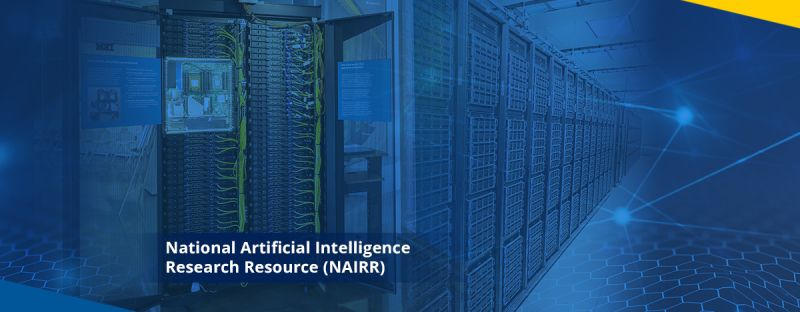
Alexandria, Virginia: In a significant step towards democratizing access to artificial intelligence (AI) research and development (R&D), the U.S. National Science Foundation (NSF) and collaborating agencies have launched the National Artificial Intelligence Research Resource (NAIRR) pilot. This initiative aims to create a shared research infrastructure that provides researchers and educators with the resources necessary to power responsible AI discovery and innovation.
The NAIRR pilot brings together 10 federal agencies, along with 25 private sector, nonprofit, and philanthropic organizations, to provide U.S.-based researchers and educators with access to advanced computing, datasets, models, software, training, and user support. By connecting researchers and educators with these resources, the NAIRR pilot aims to drive innovative AI research and inform the design of the full NAIRR ecosystem.
“The breadth of partners that have come together for this pilot underscores the urgency of developing a National AI Research Resource for the future of AI in America,” said NSF Director Sethuraman Panchanathan. “By investing in AI research through the NAIRR pilot, the United States unleashes discovery and impact, bolsters its global competitiveness, and shapes international standards while igniting economic growth. NSF is proud to lead this effort with our current and future partners.”
The collaborative nature of the pilot, which brings together academia, industry, nonprofit, and government sectors, promotes cross-sector partnerships. This collaboration has the potential to lead to the development of commercially viable AI applications and solutions, thereby fostering economic growth and creating new markets and revenue streams.
The NAIRR pilot will initially support AI research in three areas: advancing safe, secure, and trustworthy AI; applying AI to challenges in healthcare; and addressing environmental and infrastructure sustainability. In addition, the pilot will provide infrastructure support to educators to enable training on AI technologies and their responsible approaches.
The pilot’s operations will be organized into four focus areas:
NAIRR Open
NAIRR Open will enable open AI research by providing access to diverse AI resources through the NAIRR Pilot Portal and coordinated allocations.
NAIRR Secure
Co-led by the National Institutes of Health (NIH) and the Department of Energy (DOE), NAIRR Secure will enable AI research that requires privacy and security-preserving resources. This focus area will assemble exemplary privacy-preserving resources.
NAIRR Software
NAIRR Software will facilitate and explore the interoperable use of AI software, platforms, tools, and services for the NAIRR pilot resources.
NAIRR Classroom
NAIRR Classroom will reach new communities through education, training, user support, and outreach.
The launch of the NAIRR pilot meets the goal outlined in Executive Order 14110, signed by President Joe Biden in October 2023, which directed the NSF to launch a pilot for the NAIRR within 90 days. This pilot will expedite the proof of concept, with future investments in the NAIRR aiming to democratize access to AI innovation and as a result, support critical work in advancing the development of trustworthy AI.
Researchers can now apply for initial access to NAIRR pilot resources through the NAIRR pilot portal at nairrpilot.org. A second, broader call for proposals from the research community will be released in spring 2024, allowing researchers to apply for access to the full suite of NAIRR pilot resources contributed by pilot partners.
The NAIRR pilot welcomes additional private sector and nonprofit partners who are interested in collaborating on this endeavor.
FAQs
Q: What is the objective of the National AI Research Resource (NAIRR) pilot?
The objective of the NAIRR pilot is to create a shared research infrastructure that provides researchers and educators with access to advanced computing, datasets, models, software, training, and user support. This initiative aims to democratize access to AI research and innovation and inform the design of the full NAIRR ecosystem.
Q: How can researchers and educators benefit from the NAIRR pilot?
Researchers and educators can benefit from the NAIRR pilot by gaining access to critical resources necessary for their AI research and education. By connecting them with these resources, the pilot aims to power innovative AI research, drive responsible AI development, and strengthen educational opportunities.
Q: What are the four focus areas of the NAIRR pilot?
The NAIRR pilot has four focus areas:
- NAIRR Open: This focus area enables open AI research by providing access to diverse AI resources through the NAIRR Pilot Portal.
- NAIRR Secure: Co-led by the NIH and DOE, this focus area enables AI research that requires privacy and security-preserving resources.
- NAIRR Software: This focus area facilitates the interoperable use of AI software, platforms, tools, and services.
- NAIRR Classroom: This focus area reaches new communities through education, training, user support, and outreach.
Q: How can researchers apply for access to NAIRR pilot resources?
Researchers can apply for initial access to NAIRR pilot resources through the NAIRR pilot portal at nairrpilot.org. A second call for proposals will be released in spring 2024, allowing researchers to apply for access to the full suite of NAIRR pilot resources contributed by pilot partners.
Conclusion
The launch of the National AI Research Resource (NAIRR) pilot signifies a significant step towards democratizing access to AI research and innovation in the United States. By bringing together federal agencies, private sector organizations, nonprofit groups, and philanthropic entities, the NAIRR pilot aims to provide researchers and educators with the necessary resources to power responsible AI discovery and innovation. Through this collaborative effort, the NAIRR pilot seeks to drive innovative AI research, inform the design of the full NAIRR ecosystem, and strengthen the nation’s global competitiveness in AI.







